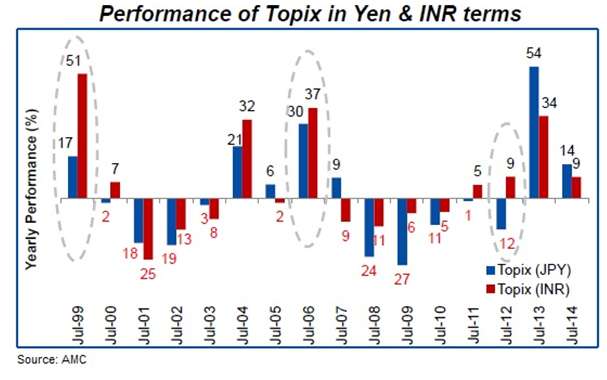Japan – the new hunting ground for investors
For those of you excited by the unusual run up in the Japanese equity markets in the last 2 years (after years of sedate performance), Reliance Mutual may offer you a chance if you are awaiting a chance to participate in it. The new fund from the Reliance stable, Reliance Japan Equity Fund, an open-ended international fund will offer this opportunity.
This will be the first Indian Mutual Fund to offer exclusive exposure to the Japanese equity markets. The NFO will close on August 20.
The Fund
The fund will seek to invest in Japanese companies that are strong brands and have a global presence. The portfolio would mostly consist of large companies that will not only benefit from economies of scale, but are capable of investing in fresh capacities to meet growing demand.
The fund will seek to identify the company with maximum sales in each industry, and then further filter based on sector potential as well as the company’s growth potential. The portfolio would have about 30 stocks. At least 80% of the fund’s assets will be invested in Japanese stocks and the rest in domestic debt instruments.
The Opportunity
If you are wondering what would an economy that has been in bad shape for decades together offer you, your thoughts are not unfounded. After all, a severe financial crisis in the 90s, fall of property prices like a ton of bricks, and the fall from grace of the famous equity market index, Nikkei (never to recover for over 2 decades), remain a well-known story of an economy that went nowhere for way too long.
However, it appears that the stagnation may be coming to a close with hope coming in the form of the new Prime Minister, Shinzo Abe, after he was elected in 2012. The stock markets were the first to react with a resounding turnaround that year which continued in 2013 (and into 2014), albeit an intermittent cool off.
Abenomics: Said to be boosted by the 3 arrows of Abenomics (fiscal stimulus, quantitative easing and structural reforms), the Japanese equity markets have been buoyant since then. Flooding the economy with money (quantitative easing similar to what was done by the US and the UK in their respective economies), Abe has been successful in pushing the economy towards an inflationary environment.
Pension money: This is expected to push money from investors, i.e., households, and especially pension funds, towards the equity markets. Reforms in the Government Pension Investment Fund worth $1.3 trillion is expected to divert more money into equities.
It is noteworthy that while US households have over 30% of their financial assets in equities, Japanese households, according to data, have less than 10%.
All these, put together, may act as a shot in the arm for the Japanese equity market’s expansion.
Improving corporate earnings: Monetary easing has also had a weakening effect on the yen, which is now steadily depreciating against the US dollar as well as the Euro. A depreciating currency strongly favours the highly export-intensive companies based out of Japan as they become more competitive in their pricing globally. Increasing sales and improving operating profit margins are all beginning to be visible in corporate numbers. Besides, the proportion of companies with net cash holdings is on the rise; requiring them to deploy the same in capex.
The Flip Side
But as is the case with any growth story, the concerns too remain. After having remained in a deflationary environment for way too long, whether companies and households can handle an inflationary scenario well is being debated by economists. Also, with very little savings done by households or by pension funds in equities, whether they will take to this asset class quickly now is suspected.
Corporate events such as consolidation, takeover, hiring and expansion are said to have become alien to many Japanese companies that have not grown for years. If the cash rich companies do not quickly deploy their funds in ways that are productive, inefficiencies could set in.
However, since developing countries such as India are increasingly keen to have business tie-ups with Japan, it suggests that Japan’s fortunes may lie within and outside as well.
Suitability
As is the case with international funds, the risk of currency volatility remains with this fund as well. You will benefit when the rupee depreciates against the yen. In the past one year, the rupee marginally appreciated against the yen. Given below is the performance of the Topix index, which will be the benchmark index for the fund.

The fund is suitable for those looking for diversification and willing to explore new markets where they perceive opportunities. International funds will be taxed at your slab rate if you exit them within 3 years of purchase. Long term capital gain benefits are available for holdings beyond 3 years.
Jahnvee Shah, who manages the AMC’s overseas investments, will manage this fund.
Investing in NFO is made simple with FundsIndia. Open a free FundsIndia account in less than 20 minutes for NFO investing.









could consider this as an asset allocation product. http://www.ddramanathan.blogspot.in
could consider this as an asset allocation product. http://www.ddramanathan.blogspot.in